Cooper Raiff and the Strength of Vulnerability
The concept of masculinity has always been tied to physical strength and mental toughness. It’s a social construct that has existed in some form or another for as long as humans have been on Earth. A man’s value has depended on how well he lives up to these ideals of masculinity. Young boys were taught to be messy, to avoid crying at all costs, and to value strength above all else. It’s a harmful way to raise an entire gender, but it’s not like the construct of femininity is any better for women.
The terms masculinity and femininity look at gender in a strictly binary way. People are forced into performing their roles, no matter how unnatural they may feel. The ones who like to enforce the rigidity of masculine and feminine roles see the attributes linked to both of these constructs as absolutes. If you are a man, you are the provider and you are strong. If you are a woman, you are domestic and you are weak. There is no in between, and anyone failing to meet these standards is a failure. It’s a harmful, cruel, and limiting way to live.
The definitions of masculinity and femininity have shifted through the generations, and now, in 2022, these boxes feel exceptionally outdated. The expectation that billions of people will all act the same way just because of their chromosomes is an unfathomably simplistic view of humanity.
Pop culture and storytelling remain essential because they are how humans learn about themselves and the world. For many years, there has been only one type of “leading man.” He’s strong, a leader, and isn’t emotional at all. He has historically been stoic and stiff. Think of Sylvester Stallone, Marlon Brando, Tom Cruise, and so on. Top Gun, which has been front of mind given the release of its sequel, Top Gun: Maverick, is a textbook example of this type of gender portrayal. Many look at Cruise’s Maverick (and most of Cruise’s other roles) as the epitome of masculinity. He’s an arrogant, fearless pilot who rides a fast motorcycle and has an effortless way with women. And yet, when Maverick’s Radar Intercept Officer and best friend dies because of Maverick’s own hubris, he’s not allowed to show a single tear. Nobody does.
Maverick isn’t alone in his stoicism. Indiana Jones, Han Solo, John McClane, Rocky Balboa, and James Bond, all share the same roguish, hard-headed characteristics. They’re all presented as the best example of what a man can be, but they lack any semblance of vulnerability. Bond has meaningless sex with beautiful women while he’s saving the world. Solo can’t even tell Leia he loves her, instead gruffly replying “I know” to her declaration of love. These movies tell us that this lack of vulnerability is cool. If the “best men” aren’t concerned with emotions, then why would John Doe in the audience pay any mind to his feelings?
In recent years, there has been a slow shift in the way some leading men carry themselves. They lead with kindness as their main form of strength instead of the physical, emotionally closed-off strength that was popular with older generations. Instead of trying to fulfil these old ideals of masculinity, they’re working to become better all-around people. Regardless of gender and outside of societal norms, they want to be good, gentle, generous individuals.
Cooper Raiff is twenty-five years old and has written, directed, and starred in one short film and two feature-length movies. His two features, Shithouse and Cha Cha Real Smooth, debuted at SXSW and Sundance respectively. The main characters of the two films are portrayed by Raiff himself, and offer a kinder blueprint for young people coming of age in the 21st century.
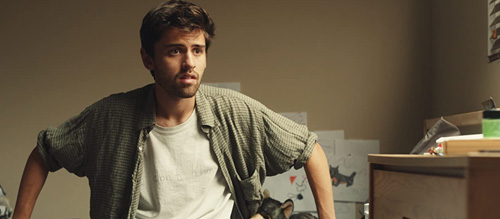
Shithouse is based on Raiff’s original short film of the same name. The short film was shot during spring break while he was in college at Occidental. Raiff was one of the co-leads, his then-girlfriend was the other, and a friend was the camera operator. It was a fifty-minute movie that he uploaded to YouTube. Raiff tweeted to renowned indie filmmaker Jay Duplass, who encouraged him to turn the film into a feature.
Shithouse is an acute look at the loneliness of the beginning of college. Alex (Raiff) is in his first semester at an out-of-state college. He’s very close to his family, and the distance, combined with the challenge of making new friends, is making the transition extremely difficult for him. His sole confidante is his stuffed wolf from home that seems to telepathically communicate with him.
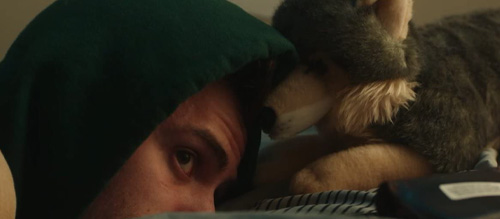
Alex’s loneliness is in stark contrast to the college experience of his roommate Sam (Logan Miller). Sam has friends, plays on the water polo team, and knows where all the parties are. He has no interest in hanging out with Alex and seems to have college entirely under control. This is devastating to Alex, and pushes him further into his shell.
Alex shares none of this with his mom and sister back home. To them, he’s thriving; picture perfect; the biggest man on campus. It’s a blatant lie that he tells for survival. It’s a lie that he deems necessary for himself and for his family, so that he feels like he made the right choice and to ensure they won’t worry about him. It’s sad that it’s a lie he feels like he has to tell. The deception has no purpose other than to maintain Alex’s image of the kind of guy he thinks he should be.
Sam mentions that he’s going to a party one night, and Alex builds up the courage to tag along. It’s a nightmare. He’s anxious in the crowd and he doesn’t want to be there. His saving grace is his RA, Maggie (Dylan Gelula). They end up spending the night together in a teen-anxious version of Before Sunrise. It’s not the glorified college experience we are accustomed to, but something much more honest. Instead, it’s Alex and Maggie aimlessly wandering around a college campus late at night. They stumble into different people and situations, talk about what they’re afraid of, what they miss from home, and what they hope for the future.

The fact that Raiff was in college and only twenty-two at the time of filming adds an urgency to this movie. He’s not far removed from his own freshman year, nor the feelings he has given to Alex and Maggie. The most striking scene is when Alex finally breaks down in a phone call with his mom (Amy Landecker) and his sister (Olivia Scott Welch), the people whose absence he has felt the most. Perhaps it’s thanks to the way his mother has raised him that Alex has the space to be honest with them. He owns up to the lies he has told, how much he has thought about quitting college, and how terrified he is that he needs to fully commit to being present. It’s a decision he doesn’t take lightly, and one that devastates him. Raiff’s performance in this scene is nothing short of revelatory. He’s sobbing, it’s uncomfortable, and his pain radiates from the screen. It’s the sort of open vulnerability that is rarely seen coming from men. His emotions and tears are matched by his mother and sister on the other end of the phone. It seems his mother has raised both of her kids the same way, regardless of gender. She has taught them both that having big feelings isn’t something to be ashamed of, that they can find freedom and strength in their openness.
In lesser movies, like Old School, men are mocked for crying and showing genuine emotion. People act like a man crying is a rare occurrence of weakness and not an incredibly normal thing to do. Even in movies where male characters see their wives or children die, all they do is shed one stoic tear and move on. There’s no real depth to these men because being in touch with their emotions is still considered to be “weak”. Not only is this reductive to men, it’s harmful to the people in their lives. It’s critical to our happiness that we tell people what they mean to us, and that we understand the strength we gain from vulnerability.
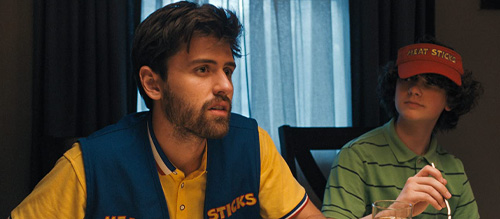
Cha Cha Real Smooth is a spiritual sequel to Shithouse. This time, the main character is Andrew (Raiff), a new college graduate who is moving back in with his parents and younger brother. He’s going from the (almost) absolute freedom of college to sleeping on an air mattress in his little brother’s room. He’s restless, confused, and struggling to figure out what the next steps in his life should be.
The only thing that seems to make sense to him is being a party starter for bar mitzvahs. Andrew is able to almost effortlessly make partygoers feel at ease and join in the fun of the event. He focuses on a young mother, Domino (Dakota Johnson), and her daughter, Lola (Vanessa Burghardt). Domino and Lola aren’t dancing because Lola is autistic and overwhelmed by crowds. Andrew never pressures Lola to do anything she’s uncomfortable with, but he’s able to make her feel relaxed. She even begins to dance away from the crowd with her mom and Andrew.
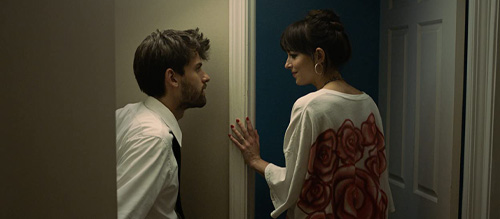
Domino and Andrew have a brief romantic fling that colors the rest of the film. It becomes clear that much of Andrew’s self-worth is wrapped tightly around what other people think of him. He needs to be liked to prove to himself that he’s an interesting person. He’s placing an enormous amount of weight on himself to be liked, without ever focusing on whether he likes himself. Andrew is filled with insecurities and doubts. Instead of putting in the hard work of looking inward, he finds his validation outwardly. Putting the burden of self-worth on others isn’t fair to anyone involved. Andrew has to hit rock bottom before he gives himself the internal love he deserves.
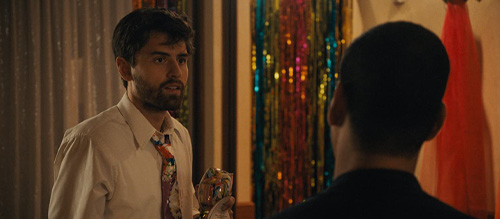
In Raiff’s work, vulnerability and kindness are his characters’ greatest attributes. It’s Alex’s renewed sense of openness that leads him to make friends who will be with him through the rest of his time in college. It’s Andrew’s kindness that finally allows him to befriend almost everyone he meets. These are characters who hold their families in their hearts and feel emotions fiercely. They are unafraid of letting this fact be known, and they wear their hearts proudly on their sleeves.
Leading with kindness in a world that doesn’t always value that emotion is an admirable way to carry oneself. In Raiff’s short career as a filmmaker, it has become clear that he is interested in celebrating vulnerable young men and women. He recognizes the difficulty of being honest, but shows the importance of pushing through that fear to a better wellbeing. His movies can feel meandering, and have been categorized as “Sundance-y,” but they are gentle hopes for the future.
Raiff is not alone in his desire to focus on kindness, and the shift is becoming clear with the younger generation. While the phrase “cancel culture” is both overused and incorrectly used, its origins come from the “extremely online” youth who believe that celebrities should be held as accountable as the friends in their real lives. It’s not a witch hunt, as some believe. It’s simply creating a higher standard, not excusing outdated behavior, and a desire to support celebrities who don’t use their position of power to abuse others.
There’s a simplicity in Raiff’s work that is commendable. There are no superpowers, no multiverses, no explosions. It’s just everyday people with everyday emotions trying desperately to figure out this confusing world we all live in. It feels like Raiff is using these films and these characters to process his own coming of age in almost real time. He’s only a year or two removed in life experience from his characters, which adds an authenticity and a richness to his scripts and performances. Raiff has a sense of urgency, a desire to get these feelings documented to show what he’s learned and to offer a path to the generation following him: the best way to move through this world is with kindness, first and foremost.
Written by Tina Kakadelis
You can support Tina Kakadelis at the following links:
Twitter – @captainameripug
Bio Site – tinakakadelis

